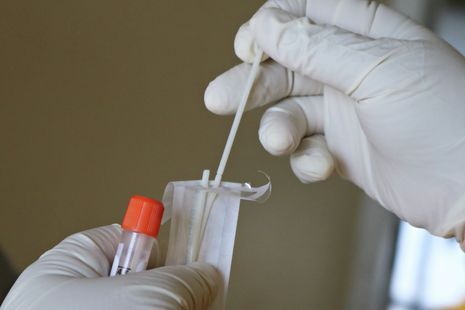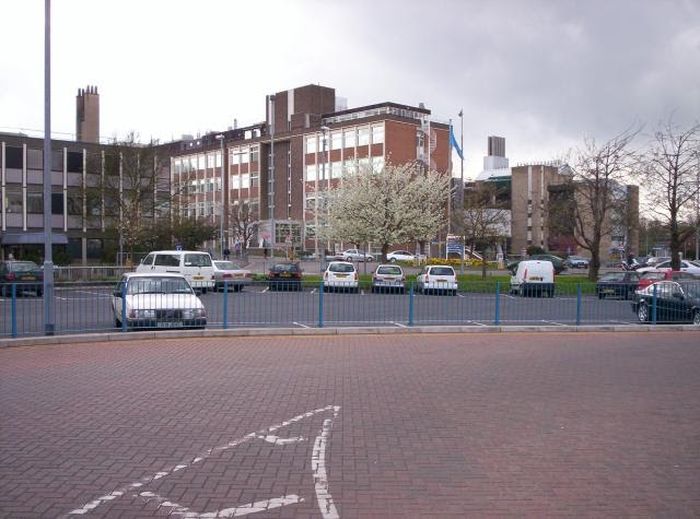Asymptomatic testing reduced Cambridge R-number by a third in Michaelmas
Genomic screening and asymptomatic testing were proven highly effective in reducing the spread of the virus

The University’s Covid-19 Testing Service, launched at the beginning of Michaelmas term, has been proven effective in limiting transmission among students through a pair of studies. It is hoped that the results of the study will provide an effective framework for the re-opening of universities and workplaces.
The first study looks at the effect of asymptomatic testing in controlling transmission, and the second looks at the impact of genomic sequencing (which allows for a ‘family tree’ of viral infection to be established) for infection control measures.
Responding to the findings of the studies, Regius Professor Patrick Maxwell said in a press release: “University students are at particular risk of transmitting coronavirus because they live in shared accommodation, and often socialise in large networks. We know that it is possible to spread the disease without showing symptoms. Our team has shown that pooled asymptomatic screening is feasible and effective, and combined with infection control measures make it possible to keep the number of infections very low.”
The asymptomatic testing service, which has screened students weekly since Michaelmas 2020, processed over 50,000 tests over the course of the term, locating 671 cases of Covid-19 throughout the Autumn season. During Lent, few cases were identified, and no cases having been found by the testing service over the past four weeks of Easter term (as of 28/05).
The first of the two studies found that weekly screening reduced the ‘R number’ across the University by approximately a third.
Dr Nicholas Matheson of the Cambridge Institute of Therapeutic Immunology and Infectious Disease (CITIID), said he is hopeful that “screening programme will serve as a useful example for other universities and colleges looking at ways to keep their students, staff and communities safe.
“Most importantly, we’ve provided real-world evidence that regular, voluntary asymptomatic screening can be effective in helping control COVID-19 transmission. With the current uncertainty around new variants of concern, and most young adults in the UK – let alone the world – not yet vaccinated, that’s an important lesson about mass testing in general, not just in universities.”
During Michaelmas, the Covid-19 Genomics UK (COG-UK) consortium analysed 446 genomes and found that “the great majority of transmission chains were short,” meaning that many individuals diagnosed with Covid-19 did not spread the virus to a large number of people. This led the authors of the second study to conclude that “infection control measures implemented by the University, including asymptomatic screening, support for self-isolation and in-house contact tracing, were successful in controlling transmission.”
The second study also found that there was little evidence of “overspill” of Covid-19 cases into the community from students, a conclusion which Dr Dinesh Aggarwal of the Department of Medicine found “reassuring.”
Responding to the findings of the two studies, Vice-Chancellor Professor Stephen Toope said: “In just eight weeks, a dedicated team at the University set up, from scratch, an innovative programme which, at its peak, was testing around 10,000 students a week. This was an incredible achievement.
“Together with staff at our University and Colleges, those colleagues have all worked tirelessly to help us keep our students, staff and the wider Cambridge community safe. I’m truly grateful to them and to every student who has taken part in the programme over the past academic year.”
 Features / Should I stay or should I go? Cambridge students and alumni reflect on how their memories stay with them15 December 2025
Features / Should I stay or should I go? Cambridge students and alumni reflect on how their memories stay with them15 December 2025 News / Cambridge study finds students learn better with notes than AI13 December 2025
News / Cambridge study finds students learn better with notes than AI13 December 2025 News / Uni Scout and Guide Club affirms trans inclusion 12 December 2025
News / Uni Scout and Guide Club affirms trans inclusion 12 December 2025 Comment / The magic of an eight-week term15 December 2025
Comment / The magic of an eight-week term15 December 2025 News / Cambridge Vet School gets lifeline year to stay accredited28 November 2025
News / Cambridge Vet School gets lifeline year to stay accredited28 November 2025










